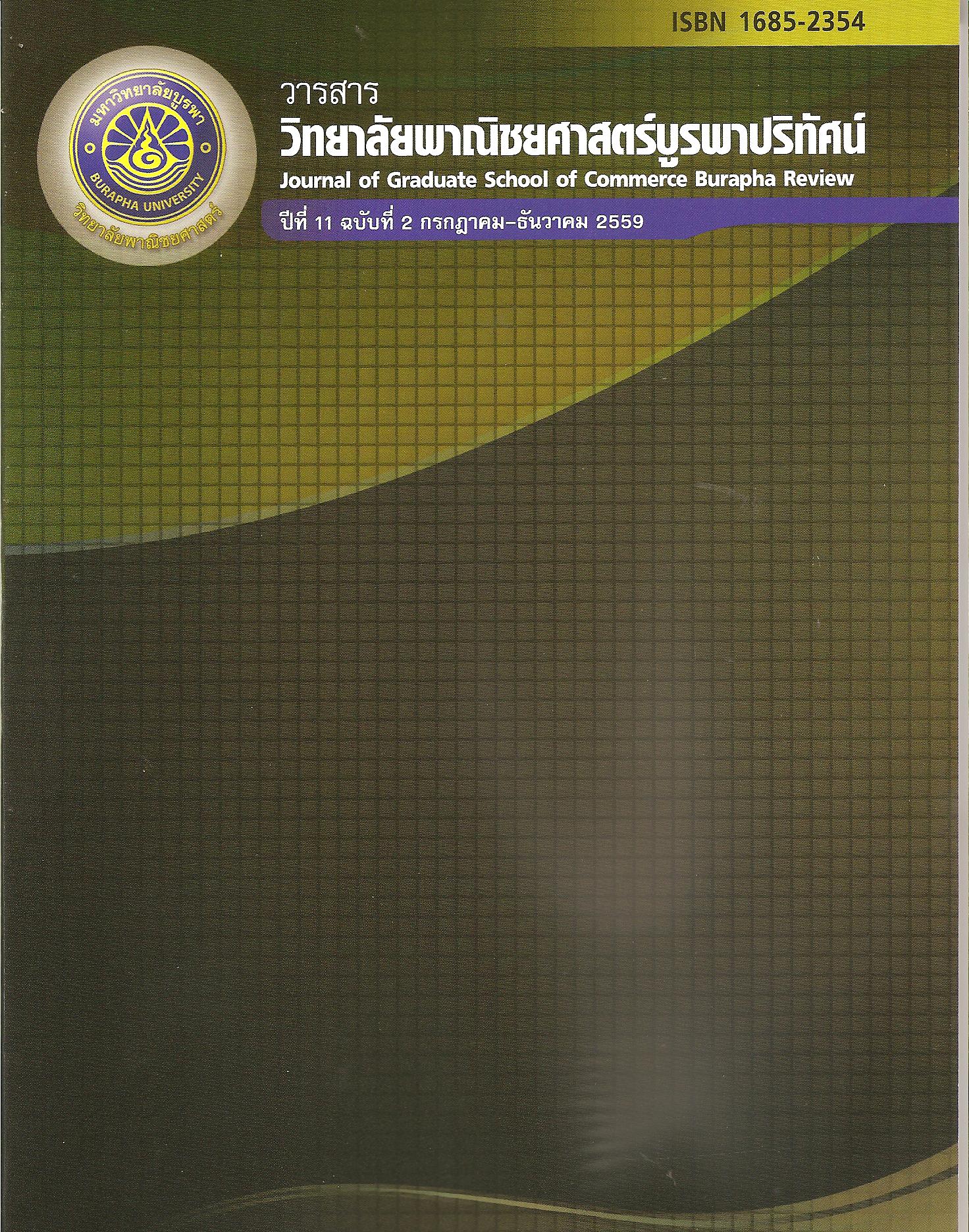โมเดลความสัมพันธ์เชิงสาเหตุของการเกี่ยวข้องกับสถานการณ์และความไว้วางใจที่มีต่อการตั้งใจเลือกซื้อจากร้านค้าออนไลน์ของผู้บริโภคชาวไทย
Main Article Content
Abstract
บทคัดย่อ
การวิจัยนี้มีวัตถุประสงค์เพื่อพัฒนาโมเดลความสัมพันธ์เชิงสาเหตุระหว่างการเกี่ยวข้องกับสถานการณ์ การรับรู้ความเสี่ยง และความไว้วางใจที่ส่งผลต่อการตั้งใจเลือกซื้อจากร้านค้าออนไลน์ของผู้บริโภคชาวไทย และตรวจสอบความสอดคล้องของโมเดลที่พัฒนาขึ้นกับข้อมูลเชิงประจักษ์ กลุ่มตัวอย่าง จำนวน 500 คน ได้มาจากวิธีการสุ่มแบบแบ่งชั้นแบบเป็นสัดส่วน โดยเป็นผู้ที่เคยซื้อสินค้าและใช้บริการจากร้านค้าออนไลน์ชาวไทย อายุ 18 ปีขึ้นไป เครื่องมือวิจัย คือ แบบสอบถามออนไลน์ วิเคราะห์ค่าสถิติพื้นฐานและค่าสัมประสิทธิ์สหสัมพันธ์โดยใช้โปรแกรม SPSS และวิเคราะห์โมเดลความสัมพันธ์เชิงสาเหตุโดยใช้โปรแกรม Mplus
ผลการวิจัยปรากฏว่า
1. โมเดลที่พัฒนาขึ้นมีความสอดคล้องกับข้อมูลเชิงประจักษ์อยู่ในเกณฑ์ดี (ค่าไคสแควร์ เท่ากับ 4.85ค่า df เท่ากับ 3 ค่า p เท่ากับ .18 ดัชนี TLI เท่ากับ .99 ดัชนี CFI เท่ากับ 1.00 SRMR เท่ากับ .03 ค่า RMSEA เท่ากับ .03 และ / df เท่ากับ 1.61)
2. โมเดลความสัมพันธ์เชิงสาเหตุระหว่างการเกี่ยวข้องกับสถานการณ์ การรับรู้ความเสี่ยง และความไว้วางใจที่มีต่อการตั้งใจเลือกซื้อจากร้านค้าออนไลน์ของผู้บริโภคชาวไทยอายุ 18 ปีขึ้นไปที่พัฒนาขึ้น แสดงให้เห็นว่า ความไว้วางใจมีอิทธิพลทางตรงต่อการตั้งใจเลือกซื้อจากร้านค้าออนไลน์มากที่สุด ส่วนการเกี่ยวข้องกับสถานการณ์และการรับรู้ความเสี่ยง มีอิทธิพลทางตรงต่อความไว้วางใจ และมีอิทธิพลทางอ้อมต่อการตั้งใจเลือกซื้อจากร้านค้าออนไลน์
สรุปได้ว่า นอกจากความไว้วางใจแล้ว การเกี่ยวข้องกับสถานการณ์และการรับรู้ความเสี่ยงมีอิทธิพลต่อการตั้งใจเลือกซื้อจากร้านค้าออนไลน์ของผู้บริโภคชาวไทย
ABSTRACT
The purpose of this research was to develop and validate a causal relationship model among situational involvement, risk perception, and trust expectation as they affect intention to buy from an e-tailer of Thai customers. The 500 participants were obtained by Proportional Stratified random sampling. They were older than 18 years and used to purchasing products from an e-tailer. The research instrument was an online questionnaire. Descriptive statistics were generated using SPSS; causal relationship modeling involved the use of Mplus.
The results were as follows:
- The developed model was consistent with empirical data. Goodness of fit statistics were: chi-square test
(
ABSTRACT
The purpose of this research was to develop and validate a causal relationship model among situational involvement, risk perception, and trust expectation as they affect intention to buy from an e-tailer of Thai customers. The 500 participants were obtained by Proportional Stratified random sampling. They were older than 18 years and used to purchasing products from an e-tailer. The research instrument was an online questionnaire. Descriptive statistics were generated using SPSS; causal relationship modeling involved the use of Mplus.
The results were as follows:
1. The developed model was consistent with empirical data. Goodness of fit statistics were: chi-square test
() = 4.85, df = 3, p= .18, TLI = .99, CFI = 1.00, SRMR = .03, RMSEA = .03, and relative chi-square (
/df) =1.61.
2. The developed model between situational involvement, trust expectation, and intention to buy from an e-tailer among Thai customers aged older than 18 years indicated that trust expectation had the strongest significant direct effect on intention to buy from an e-tailer, while situational involvement and risk perception had a significant direct effect on trust expectation, and indirect effects on intention to buy from an e-tailer.
In conclusion, besides trust expectation, situational involvement and risk perception also influenced the intention to buy from an e-tailer among Thai customers.
() = 4.85, df = 3, p= .18, TLI = .99, CFI = 1.00, SRMR = .03, RMSEA = .03, and relative chi-square (
/df) =1.61.
2. The developed model between situational involvement, trust expectation, and intention to buy from an e-tailer among Thai customers aged older than 18 years indicated that trust expectation had the strongest significant direct effect on intention to buy from an e-tailer, while situational involvement and risk perception had a significant direct effect on trust expectation, and indirect effects on intention to buy from an e-tailer.
In conclusion, besides trust expectation, situational involvement and risk perception also influenced the intention to buy from an e-tailer among Thai customers.
Article Details
The owner of the article does not copy or violate any of its copyright. If any copyright infringement occurs or prosecution, in any case, the Editorial Board is not involved in all the rights to the owner of the article to be performed.


